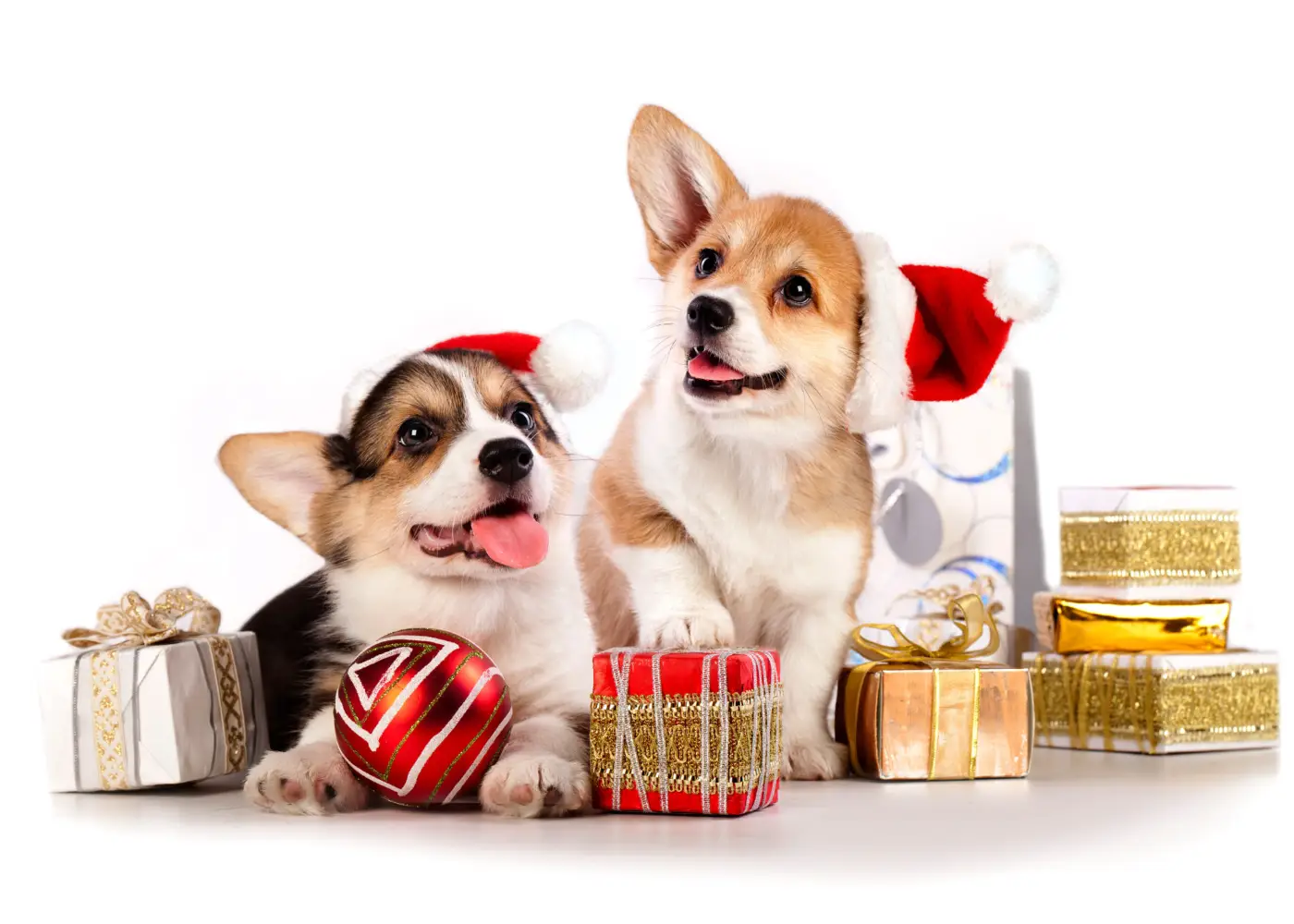The holidays are upon us, and you’re probably planning to enjoy several weeks of shopping, parties, food, family, and fun. Decking the halls, baking cookies, and wrapping gifts are all part of celebrating, but many of these activities pose hazards for your pets. Be sure to take precautions this Christmas and Hanukkah season so that your holiday festivities don’t turn into an emergency trip to the vets or a stressed-out, unhappy puppy. Here are a few suggestions from all of us at Puppys R Us for a magical holiday season for you and your dogs.
The Christmas Tree and Décor
Keep in mind that your dog or cat will be curious about the Christmas tree (after all, suddenly discovering a tree in the house is intriguing for any animal). Be sure the tree is firmly in place to withstand some nudging and sniffing. Keep any delicate ornaments at the top of the tree where they can’t be reached. Use inexpensive or unbreakable ornaments at pet height.
Decorations pose many hazards for dogs. If your puppy likes to chew on things, minimize their access to strands of lights and extension cords to avoid a potentially lethal electric shock. Decorations that could break should be placed where your pets can’t reach them. If you love decorating with fresh greenery, be sure your dog or cat doesn’t eat them. Pine needles can puncture internal organs or damage the throat. Some plants, like mistletoe and holly, are poisonous.
Wrapping and Gifts
Most of us stockpile the gifts in one area or room of the house where we do all our gift wrapping (maybe watching “It’s a Wonderful Life” or “A Christmas Carol” for the umpteenth time, or is that just us?). Keep the door closed and your dogs out if possible so that you don’t have to worry about them tearing things up or eating a spool of ribbon. If this isn’t practical, you’ll have to stow everything away when you aren’t wrapping presents.
Foods
Your dog probably lives for the holidays if you have dog lovers in your family who slip them scraps under the holiday table, but too much of a good thing is bad for everyone, dogs included. Resist the temptation to give your dog too many samples of your cooking, particularly anything rich or fatty that could lead to pancreatitis, a painful and expensive illness.
Remind your guests they should never give your dog certain treats, including:
- Fatty foods
- Cooked bones, which can splinter in their digestive tract
- Chocolate
- Anything with xylitol sweetener
- Spicy foods
- Alcoholic drinks (not even a sip, as most dogs weigh less than humans and get easily intoxicated or sick)
- Grapes and raisins
- Coconut and coconut milk
- Nuts, especially Macadamia nuts
The wisest course is to ask your guests to refrain from giving your dog any food scraps. Instead, stock up on some special holiday dog treats that people can offer your pet in moderation. If you’re into holiday baking, you’ll find lots of delicious recipes for making your own dog biscuits and treats from scratch.
Inform Your Guests About Your Pets
If you’re hosting out-of-town relatives or throwing a holiday party, be sure you let everyone know in advance that you have dogs. Guests who have allergies or are afraid of dogs can be startled or frightened when confronted with your pet, which is never a good thing. Letting everyone know what to expect will minimize the risk of a dog bite or other injury.
Give Your Dog a Safe Retreat
Some puppies and dogs thrive on extra attention and will happily greet visitors and play with guests, but at Puppys R Us, we know that every dog has a unique personality. If your furry friend is nervous around strangers or doesn’t like the noise and confusion when guests show up, make sure they have a place to retreat that makes them feel safe and secure. Ideally, this should be a separate room with fresh water, a few toys, and a cozy place to nap. If your dogs are crate-trained, put a soft bed or blanket in the crate with fresh water and place it somewhere out of the way with the door open so they can come and go easily.
Address Anxiety Issues in Advance
Some dogs suffer from such intense anxiety around people they don’t know that they need additional help. If your dog is wary around guests or gets overly excited, talk to a veterinarian about giving your dog a calming aid. Several brands of over-the-counter calming chews contain ingredients such as valerian, CBD, and chamomile that help take the edge off. In severe cases, your vet may prescribe a stronger medication to help get them through the holidays.
Boarding or Travel
Going to grandma’s house or traveling to your sister’s place several states away can be an excellent adventure for dogs if they enjoy riding in the car. If they don’t, plan in advance to give them a calming treat and make frequent stops for potty breaks and stretching their legs. Give them a light meal an hour or two before leaving, then limit their eating to small amounts while on the road.
Strange surroundings may encourage your pet to take off for a bit of exploring, so be sure your dog is always wearing a collar with your contact information. We also encourage you to have your pets chipped by your vet (you’d be amazed at how far a missing dog can travel) before leaving on an extended trip. When you reach your destination, as your hosts where you can set up a retreat corner for your dog that you can set up for their comfort.
And, of course, give your dogs plenty of praise and snuggles throughout the holidays so they know they haven’t been forgotten during the holiday rush.
